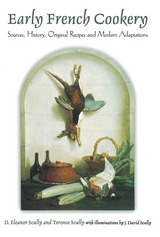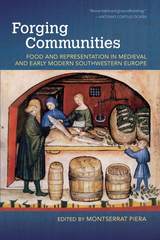3 books about Cooking, Medieval

Early French Cookery
Sources, History, Original Recipes and Modern Adaptations
D. Eleanor Scully and Terence Scully
University of Michigan Press, 2002
Early French Cookery introduces the general features of the food prepared for wealthy French households at the end of the Middle Ages. The volume presents over 100 recipes, drawn from actual medieval manuscripts, together with preparation instructions. The authors help place these enticing recipes in context through a short survey of medieval dining behavior, and they give practical menu suggestions for preparing simple meals or banquets that incorporate these delightfully tasty dishes.
Chapters include an overview of early French culinary traditions, foodstuffs that were used, and methods of preparation. Early French Cookery also discusses the equipment of the kitchens and dining rooms that were used, and characterizes those who prepared the food and those who consumed it.
The recipes are set out in a modern format, with quantities given in both metric and standard U.S. measurements. Recipes are grouped by category: appetizers, vegetables, fish dishes, desserts, and so forth.
Early French Cookery concludes with a fascinating look at a day in the life of a contemporary master chef at a duke's court. We watch Master Chiquart organize the purchase, storage, preparation, and serving of the food consumed by a duke and his dozens of family members, courtiers, staff and servants--and all done without benefit of grocery stores, refrigeration, labor-saving electric appliances, or running water.
Early French Cookery will be of interest to a wide variety of people, from those who like to hold unusual parties to those who are interested in the economics of the middle ages.
D. Eleanor Scully is an occasional lecturer at the Stratford Chef School and advisor to Wilfrid Laurier University on Medieval and Renaissance cooking and customs. Terence Scully is Professor of French Language and Literature, Wilfrid Laurier University, Waterloo, Ontario.
Chapters include an overview of early French culinary traditions, foodstuffs that were used, and methods of preparation. Early French Cookery also discusses the equipment of the kitchens and dining rooms that were used, and characterizes those who prepared the food and those who consumed it.
The recipes are set out in a modern format, with quantities given in both metric and standard U.S. measurements. Recipes are grouped by category: appetizers, vegetables, fish dishes, desserts, and so forth.
Early French Cookery concludes with a fascinating look at a day in the life of a contemporary master chef at a duke's court. We watch Master Chiquart organize the purchase, storage, preparation, and serving of the food consumed by a duke and his dozens of family members, courtiers, staff and servants--and all done without benefit of grocery stores, refrigeration, labor-saving electric appliances, or running water.
Early French Cookery will be of interest to a wide variety of people, from those who like to hold unusual parties to those who are interested in the economics of the middle ages.
D. Eleanor Scully is an occasional lecturer at the Stratford Chef School and advisor to Wilfrid Laurier University on Medieval and Renaissance cooking and customs. Terence Scully is Professor of French Language and Literature, Wilfrid Laurier University, Waterloo, Ontario.
[more]

Forging Communities
Food and Representation in Medieval and Early Modern Southwestern Europe
Montserrat Piera
University of Arkansas Press, 2018
Forging Communities explores the importance of the cultivation, provision, trade, and exchange of foods and beverages to mankind’s technological advancement, violent conquest, and maritime exploration. The thirteen essays here show how the sharing of food and drink forged social, religious, and community bonds, and how ceremonial feasts as well as domestic daily meals strengthened ties and solidified ethnoreligious identity through the sharing of food customs. The very act of eating and the pleasure derived from it are metaphorically linked to two other sublime activities of the human experience: sexuality and the search for the divine.
This interdisciplinary study of food in medieval and early modern communities connects threads of history conventionally examined separately or in isolation. The intersection of foodstuffs with politics, religion, economics, and culture enhances our understanding of historical developments and cultural continuities through the centuries, giving insight that today, as much as in the past, we are what we eat and what we eat is never devoid of meaning.
This interdisciplinary study of food in medieval and early modern communities connects threads of history conventionally examined separately or in isolation. The intersection of foodstuffs with politics, religion, economics, and culture enhances our understanding of historical developments and cultural continuities through the centuries, giving insight that today, as much as in the past, we are what we eat and what we eat is never devoid of meaning.
[more]

The Medieval Kitchen
Recipes from France and Italy
Odile Redon, Françoise Sabban, and Silvano Serventi
University of Chicago Press, 1998
The Medieval Kitchen is a delightful work in which historians Odile Redon, Françoise Sabban, and Silvano Serventi rescue from dark obscurity the glorious cuisine of the Middle Ages. Medieval gastronomy turns out to have been superb—a wonderful mélange of flavor, aroma, and color. Expertly reconstructed from fourteenth- and fifteenth-century sources and carefully adapted to suit the modern kitchen, these recipes present a veritable feast. The Medieval Kitchen vividly depicts the context and tradition of authentic medieval cookery.
"This book is a delight. It is not often that one has the privilege of working from a text this detailed and easy to use. It is living history, able to be practiced by novice and master alike, practical history which can be carried out in our own homes by those of us living in modern times."—Wanda Oram Miles, The Medieval Review
"The Medieval Kitchen, like other classic cookbooks, makes compulsive reading as well as providing a practical collection of recipes."—Heather O'Donoghue, Times Literary Supplement
"This book is a delight. It is not often that one has the privilege of working from a text this detailed and easy to use. It is living history, able to be practiced by novice and master alike, practical history which can be carried out in our own homes by those of us living in modern times."—Wanda Oram Miles, The Medieval Review
"The Medieval Kitchen, like other classic cookbooks, makes compulsive reading as well as providing a practical collection of recipes."—Heather O'Donoghue, Times Literary Supplement
[more]
READERS
Browse our collection.
PUBLISHERS
See BiblioVault's publisher services.
STUDENT SERVICES
Files for college accessibility offices.
UChicago Accessibility Resources
home | accessibility | search | about | contact us
BiblioVault ® 2001 - 2024
The University of Chicago Press









